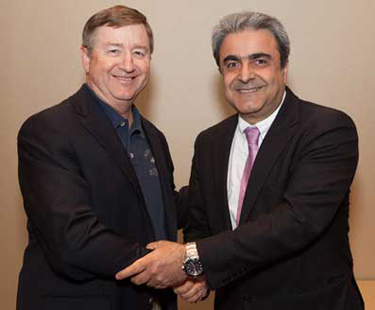From left to right: Frank Culbertson, senior vice president for Orbital Sciences Corporation, former astronaut and international space station commander, and Dr. Ali Eskandarian, Dean of the Virginia Science and Technology Campus, at GW's Sixth Annual Science, Technology, and Engineering Day in April 2012. (Photo by Jessica Burt)
The first GW building opened in Loudoun County in 1991, at a time when there were only 90,000 residents, and the “dot-com boom” was a mere rumble. Soon thereafter, UUNet emerged as one of the first commercial internet providers, AOL relocated to its Dulles Campus, and Loudoun County spent more than a decade being known as one of the fastest growing counties in the United States.
Twenty years later, the bucolic countryside has been transformed into a vibrant, bustling suburban area with strong industry clusters, and the campus’ development has kept pace with it. The campus has grown to five buildings, academic programs and research initiatives have evolved, and the Virginia Campus has been renamed the Virginia Science and Technology Campus (VSTC). The Dulles Technology Corridor is now home to the largest number of Internet, satellite, and defense companies in the nation, and has become a global digital center through which 50 percent of the world’s Internet traffic passes.
It is an exciting time and place for a newly appointed dean of the VSTC, especially for Dr. Ali Eskandarian, a theoretical physicist with a professional background in space policy and scientific satellite development.
Dr. Eskandarian is now the dean of the VSTC, as well as the dean of the College of Professional Studies. In his new role he is leading the campus in its next phase of strategic development as GW embarks on its 21st year in Loudoun County.
“Under his leadership I’m confident this campus will enjoy continued growth in its academic and research programs,” remarked University President Steven Knapp, when announcing Dr. Eskandarian’s appointment in October 2011.
Dr. Eskandarian began his career at GW in 2002 as an associate dean and one of the founding members of the team that launched GW’s College of Professional Studies (CPS). Thereafter, he served as the senior associate dean for strategic initiatives and research at CPS, where he led the design and development of several innovative certificates and master’s degree programs. He combines solid grounding in academics with significant administrative and entrepreneurial experience.
“As we look to the future of the campus, I envision strategic growth in research initiatives and non-traditional academic programming to address problems and needs of national importance. I am especially excited about new opportunities within our already strong research groups of transportation safety, renewable energy, earthquake resistant structures, magnetic nanostructures, and high performance computing, as well as a new initiative in Computational Biology,” Dr. Eskandarian said.
Since taking on the role as dean at the VSTC, Dr. Eskandarian has become actively engaged with key community stakeholders in Loudoun County as well as those throughout the Commonwealth of Virginia. He serves on the Loudoun Chamber Board of Directors and the Loudoun CEO Cabinet. He also actively participates with the Council of Independent Colleges in Virginia and is expanding partnerships with Virginia’s Community College System.
Before coming to GW, Eskandarian worked at Computer Science Corporation, James Madison University (JMU), and the National Research Council. At JMU, he held the Distinguished Oliver Professorship in the Integrated Science & Technology and Computer Science Departments and led the program in Telecommunications, where he also held the title of Virginia Eminent Scholar.
In the mid-1990s, Dr. Eskandarian was the director for the “Reusable Launch Vehicles: Technology Development and Test Program” study at the National Research Council. The study led to important recommendations regarding future technological options and the nation’s space policy. He subsequently served as an adviser to the Army Research Laboratory’s Technology Assessment Board. Earlier in the 1990s, after having completed a post–doctoral position at Flinders University of South Australia in theoretical nuclear physics, Dr. Eskandarian joined the aerospace industry and worked on the scientific satellites being developed at NASA’s Goddard Space Flight Center for several space missions.
Dr. Eskandarian’s current research interests at GW are focused in astrophysics and in quantum computing/information. He holds a B.S. in physics and a Ph.D. in theoretical nuclear physics, both from GW.
“As an educator, researcher, and administrator I am committed to the campus being a thriving intellectual hub and a strong community partner in Northern Virginia and throughout the Commonwealth of Virginia,” Dr. Eskandarian commented.


